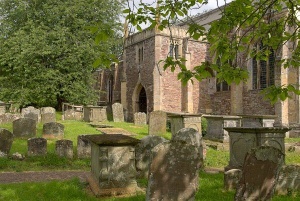
Summary
A striking 13th century church standing beside Berkeley Castle. The church is notable for its medieval wall paintings, detached tower, table tombs, and memorials to the Berkeley family.
There has been a church here as early as the Saxon period, but the present St Mary's dates primarily to the 13th and 14th centuries. The sheer size of the church is striking, situated as it is in such a small village. More unusual is the detatched tower, a feature more commonly found on the European continent but rarely in England. The tower is 17th century, and stands on the site of an earlier church.
Civil War
Though it stands in a peaceful wooded glade beside the entry to Berkeley Castle, St Mary's has not always been a peaceful place; during the English Civil War the Royalist forces defending Berkeley Castle used the church as an outer defensive perimeter for their defense of the castle. The marks of bullets fired by the attacking Parliamentary forces can be seen in the west door. The defenders of the church were eventually overcome, and the Parliamentary army raised cannon to the church roof, overlooking the castle, and the castle was forced to surrender.

The churchyard
A special feature of St Mary's is the sheer number of table tombs in the churchyard. The most famous of these tombs is the early 18th century memorial to Dickie Pearce, family jester to the Earl of Suffolk. Pearce, probably the last 'court jester' in England, died at Berkeley Castle and was buried in the churchyard. Pearce is supposed to have died after falling from the minstrel gallery during a performance, though an alternative version is that he was murdered. The verse inscribed on the tomb is thought to be the work of the author Jonathan Swift.
The interior
St Mary's features a wonderful collection of medieval wall paintings, including a 'doom' painting above the rood screen. The paintings lay for centuries under layers of whitewash, and were only discovered by accident during cleaning in the Victorian period. In addition to the paintings, and the lovely painted rood screen which we've mentioned, the interior is notable for the memorials to the Berkeleys of Berkeley Castle. The tomb of Thomas Berkeley, the 5th Baron, and his wife Katherine, is worth mentioning for the excellent carving detail. This tomb is found on the north side of the nave.
The oldest parts of St Mary's are the south door and the font, both of which date to the Norman period. The great east window contains a stained glass memorial to one of the village's favourite sons, Edward Jenner, who discovered the smallpox vaccine. Jenner's stone memorial is beside the alter, and to the other side is the Berkeley chapel, which contains a wonderful collection of medieval memorials to the Berkeley family. Dr Jenner's home of The Chantry stands immediately beside the churchyard and is now a museum to his life and work.
About Berkeley
Address: Church Lane,
Berkeley,
Cotswolds,
Gloucestershire,
England, GL13 9BN
Attraction Type: Historic Church
Location: Located beside Berkeley Castle
Website: Berkeley
Location
map
OS: ST684990
Photo Credit: David Ross and Britain Express
HERITAGE
 We've 'tagged' this attraction information to help you find related historic attractions and learn more about major time periods mentioned.
We've 'tagged' this attraction information to help you find related historic attractions and learn more about major time periods mentioned.
Historic Time Periods:
Find other attractions tagged with:
13th century (Time Period) - castle (Architecture) - Medieval (Time Period) - wall paintings (Historical Reference) -
NEARBY HISTORIC ATTRACTIONS
Heritage Rated from 1- 5 (low to exceptional) on historic interest
Berkeley Castle - 0 miles (Castle) ![]()
Dr Jenner's House - 0.1 miles (Historic Building) ![]()
Slimbridge Wildfowl and Wetlands Trust - 4.3 miles (Family Attraction) ![]()
Lydney Park - 4.4 miles (Garden) ![]()
Lydney Park Roman Camp - 4.4 miles (Roman Site) ![]()
Charfield, St James Church - 5.3 miles (Historic Church) ![]()
Kingswood Abbey Gatehouse - 5.8 miles (Abbey) ![]()
Uley Long Barrow (Hetty Pegler's Tump) - 6.5 miles (Prehistoric Site) ![]()









